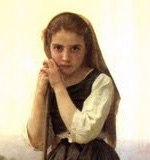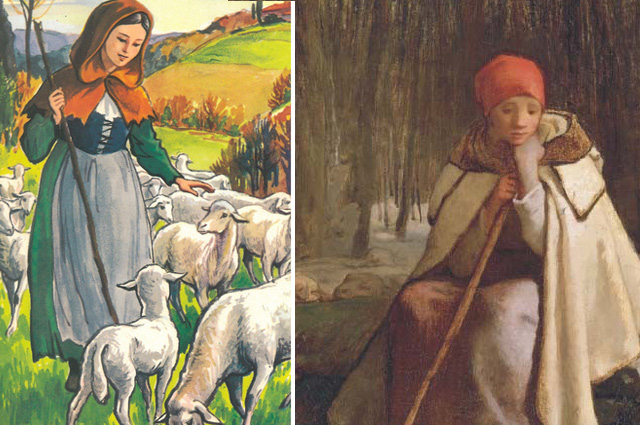Saint of the Day Online - St. Germaine Cousin
Saint of the Day for Thursday, June 15, 2017
15-06-2017
Saint Name: St. Germaine Cousin
Place: Pibrac, Germana
Birth: 1579
Death: 1601
Feast: 15 June
St. Germaine Cousin was born in 1579 at Pibrac, Germana. She is a French saint. She was born of humble parents at Pibrac, a village about ten miles from Toulouse. Weak and ill, the girl had also been born with a right hand that was deformed and paralyzed. Hortense replaced the love that Germaine has lost when her mother died of cruelty and abuse.
Germaine had been given so little food that she had learned to crawl in order to get to the dog's dish. He wasn't there to protect her when Hortense left Germaine in a drain while she cared for chickens -- and forgot her for three days. He didn't even interfere when Hortense poured boiling water on Germaine's legs
Her father soon married again, but his second wife treated Germaine with much cruelty. Under the pretense of saving the other children from the contagion of scrofula she persuaded the father to keep Germaine away from the homestead, and thus the child was employed almost from infancy as a shepherdess. When she returned at night, her bed was in the stable or on a litter of wine branches in a garret. In this hard school, Germaine learned early to practice humility and patience. She was gifted with a marvelous sense of the presence of God and of spiritual things so that her lonely life became to her a source of light and blessing.

Germaine was soon entrusted with the sheep. No one expected her to have any use for education so she spent long days in the field tending the sheep. Instead of being lonely, she found a friend in God. She didn't know any theology and only the basics of the faith that she learned the catechism. But she had a rosary made of knots in the string and her very simple prayers: "Dear God, please don't let me be too hungry or too thirsty. Help me to please my mother. And help me to please you." Out of that simple faith, grew a profound holiness and a deep trust in God.
Her love for Jesus in the Blessed Sacrament and for His Virgin Mother presaged the saint. She assisted daily at the Holy Sacrifice; when the bell rang, she fixed her sheep-hook or distaff on the ground and left her flocks to the care of Providence while she heard Mass. Although the pasture was on the border of a forest infested with wolves, no harm ever came to her flocks."
Hortense, furious at the stories about her daughter's holiness, waited only to catch her doing wrong. One cold winter day, after throwing out a beggar that Germaine had let sleep in the barn, Hortense caught Germaine carrying something bundled up in her apron. Certain that Germaine had stolen bread to feed the beggar, she began to chase and scream at the child. As she began to beat her, Germaine opened her apron. Out tumbled what she had been hiding in her apron -- bright beautiful flowers that no one had expected to see for months. Where had she found the vibrant blossoms in the middle of the ice and snow? There was only one answer and Germaine gave it herself, when she handed a flower to her mother and said, "Please accept this flower, Mother. God sends it to you in sign of his forgiveness."
As the whole village began to talk about this holy child, even Hortense began to soften her feelings toward her. She even invited Germaine back to the house but Germaine had become used to her straw bed and continued to sleep in it. One morning in the early summer of 1601, her father found that she had not risen at the usual hour and went to call her, finding her dead on her pallet of vine-twigs. She was 22 years old at the time.
With all the evidence of her holiness, her life was too simple and hidden to mean much beyond her tiny village -- until God brought it too light again. When her body was exhumed forty years later, it was found to be undecayed, what is known as incorruptible. As is often the case with incorruptible bodies of saints, God chooses not the outwardly beautiful to preserve but those that others despised as ugly and weak. It's as if God is saying in this miracle that human ideas of beauty are not his. To him, no one was more beautiful than this humble lonely young woman.